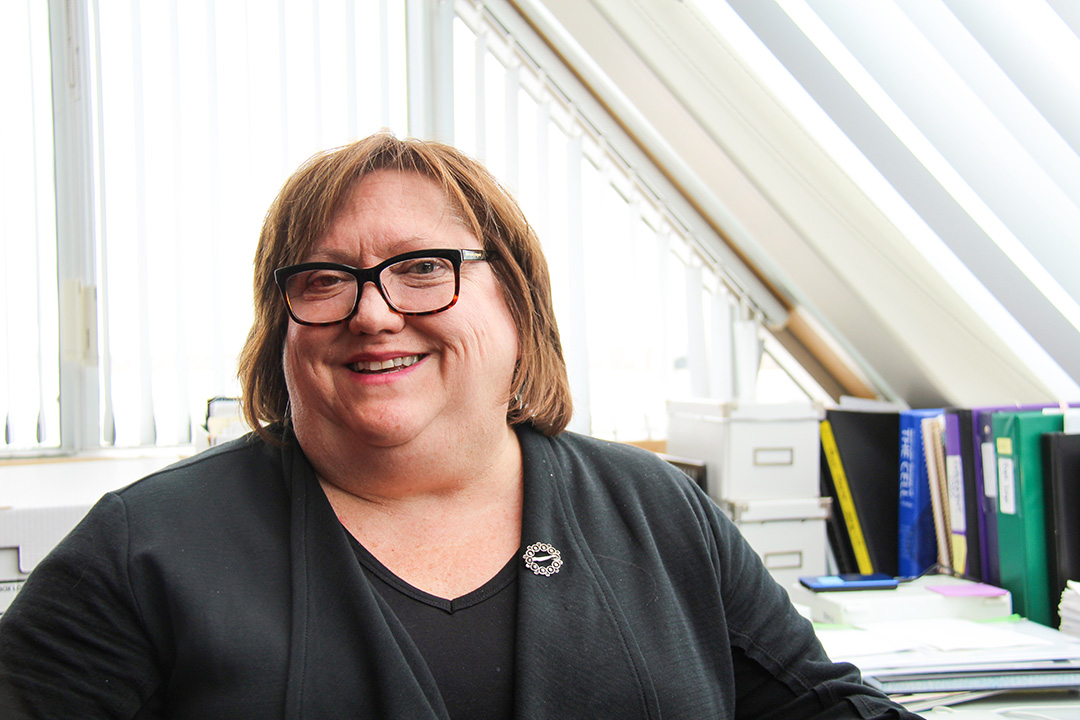
MS researcher dedicated to improving lives
In nearly 40 years of investigating how the body repairs its nervous system, Dr. Valerie Verge (PhD) hasn’t found all of the answers yet, but she’s getting closer.
By Kristen McEwen“I would hope that at this stage in my career, I’m at the point where I’m turning on light switches that are truly important in the process and we are getting far closer to understanding what some of those key processes are,” Verge said.
Verge is a neuroscientist and professor in the Department of Anatomy, Physiology and Pharmacology in the College of Medicine at the University of Saskatchewan (USask). She’s also the director of the Cameco MS Neuroscience Research Centre located at Saskatoon City Hospital and an emerita Medical Research Council of Canada Fellow and Scholar.
Verge was honoured at the 2019 Women Against MS Gala Luncheon on Nov. 21. The event recognized Verge’s remarkable contributions as a multiple sclerosis (MS) researcher based in Saskatchewan.
MS is a highly prevalent autoimmune disease in Saskatchewan. The disease causes damage to the myelin surrounding the axons of nerve cells, which disrupts effective signaling between cells. It can result in loss of eyesight, paralysis and pain.
“It’s been a long-time goal for me to make a difference in people’s lives, especially those that suffer from MS,” Verge explained.
The researcher has close connections to the disease. Her best friend was diagnosed with MS just as Verge entered graduate studies in 1986.
“It’s one thing for you to intellectually know about the pathology of a disease, and to know these are the expected steps of disease progression,” Verge said. “But to actually know someone who is living day-to-day with the disease, and what it’s robbing them of … MS is pretty insidious.”
Verge has been working at USask since 1992. Prior to moving to Saskatchewan, Verge completed her PhD at McGill University. As Verge completed her post-doctoral studies in Stockholm, Sweden, she found her connection to Saskatchewan. On the plane back to Canada, she met a farmer by the name of Ole Olson from Plenty, Sask.
Verge described her now-husband as a “total science geek” which allowed them to bond on the way home. She eventually went on to apply for a position at the College of Medicine where she continued her research into repair of the nervous system.
Her current research focuses on how to encourage cells within the nervous system to repair themselves—to prevent some of the progression of symptoms in people with MS. Her research team is investigating how to non-invasively stimulate nerve cells and impose a low level of stress that the team has recently found is linked to more effective repair. She compared the repair process to exercising and the stress that’s put on the heart. Exercising causes a small amount of damage to the heart, with the heart muscle turning on repair responses and the heart becoming stronger, she explained.
“This is the beauty of neuroscience research, it is constantly evolving,” Verge said. “Every time you think you have a handle on one aspect, another crops that sheds new light, sometimes by your own findings.”
Verge compares her research on effectively repairing the nervous system to putting together a 5,000-piece jigsaw puzzle.
“Once you’re down to the last few 100 pieces, they’re much easier to put in place than the ones before,” Verge said. “You spend a lot of time trying to create the picture you’re going to need, and the solutions you’re going to need.”
It’s her determination that has steered the course of Verge’s research.
“If you’re as stubborn and as persistent as most scientists are … it’s those qualities that really keep you going,” Verge added. “And it’s the small victories along the way.”
Article re-posted on .
View original article.
